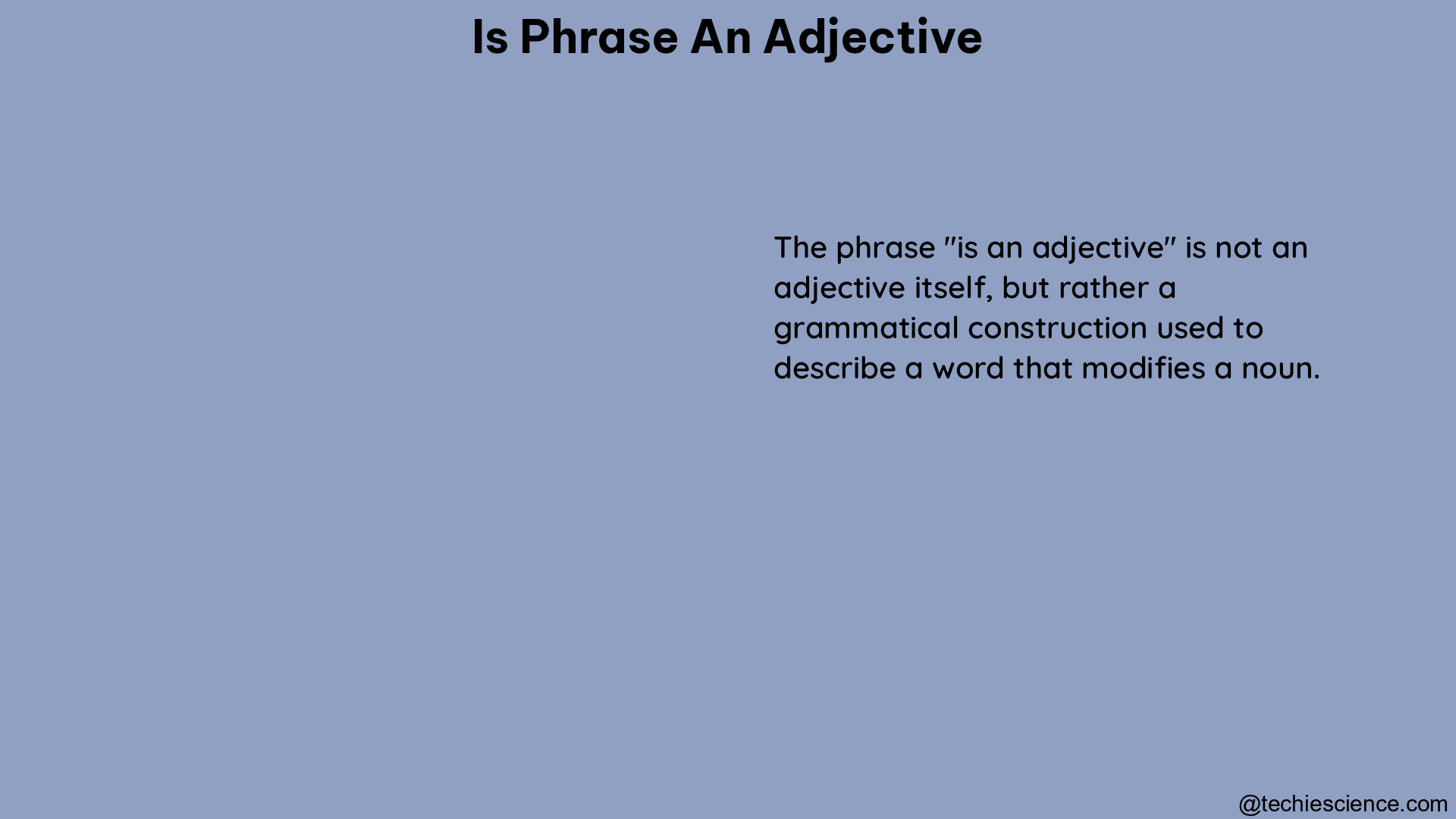An adjective phrase is a grammatical construct that functions as an adjective within a sentence, providing additional details and descriptions about a noun or pronoun. Understanding the intricacies of adjective phrases is crucial for effective communication and sentence construction. In this comprehensive guide, we will delve into the key characteristics, formation, and distinction of adjective phrases, equipping you with the knowledge to master this essential aspect of the English language.
Defining Adjective Phrases
An adjective phrase is a group of words that collectively acts as an adjective, modifying a noun or pronoun in a sentence. Unlike a single-word adjective, an adjective phrase can be composed of various word combinations, including adjectives, adverbs, prepositional phrases, and participial phrases. These phrases provide more detailed and nuanced descriptions of the noun or pronoun they modify.
Key Characteristics of Adjective Phrases

1. Acts as an Adjective
The primary function of an adjective phrase is to modify a noun or pronoun, providing additional information about its characteristics, qualities, or attributes. This modification helps to paint a more vivid and precise picture for the reader or listener.
2. Contains an Adjective
At the core of an adjective phrase is an adjective, which can be positioned at the beginning, middle, or end of the phrase. This adjective serves as the central element that anchors the phrase and determines its descriptive function.
3. Attributive or Predicative
Adjective phrases can be used in two primary ways within a sentence: attributive and predicative. Attributive adjective phrases precede the noun they modify, while predicative adjective phrases follow the noun and a linking verb, such as “to be” or “to become.”
4. Diverse Formation
Adjective phrases can be constructed in various ways, including:
– Series of adjectives (e.g., “the tall, slender woman”)
– Adverb-adjective combinations (e.g., “the extremely delicious cake”)
– Comparative or superlative adjectives (e.g., “the most beautiful sunset”)
– Prepositional phrases (e.g., “the book with the red cover”)
– Participial phrases (e.g., “the smiling child”)
Examples of Adjective Phrases
Attributive Adjective Phrases
- The very hot coffee spilled on my arm.
- She wore very expensive shoes.
Predicative Adjective Phrases
- The coffee was very hot.
- The frames are beautifully carved and priceless.
Distinguishing Adjective Phrases from Adjective Clauses
It is important to note the distinction between adjective phrases and adjective clauses. While both serve to modify nouns or pronouns, the key difference lies in their structure. Adjective phrases do not contain a subject and a verb, whereas adjective clauses do include a subject and a verb, typically introduced by a relative pronoun (e.g., “who,” “which,” “that”).
Mastering Adjective Phrases
Proficiency in using adjective phrases can significantly enhance your writing and speaking skills. By incorporating well-crafted adjective phrases, you can:
– Provide more detailed and vivid descriptions
– Convey nuanced and precise information about the subject
– Improve the overall clarity and coherence of your sentences
– Engage your audience with more engaging and descriptive language
To effectively master adjective phrases, consider the following strategies:
1. Identify Adjective Phrases: Practice identifying adjective phrases in various written and spoken contexts, noting their structure and function within the sentence.
2. Experiment with Placement: Experiment with positioning adjective phrases in different parts of the sentence, observing the impact on the overall meaning and emphasis.
3. Expand Your Adjective Vocabulary: Continuously expand your repertoire of adjectives to create more diverse and compelling adjective phrases.
4. Analyze Exemplary Usage: Study how professional writers and speakers employ adjective phrases to enhance their writing and speech, and apply those techniques in your own communication.
5. Practice, Practice, Practice: Regularly incorporate adjective phrases into your own writing and speaking, refining your skills through consistent application.
Conclusion
Adjective phrases are a powerful tool in the English language, allowing you to provide more detailed and nuanced descriptions of nouns and pronouns. By understanding the key characteristics, formation, and distinction of adjective phrases, you can elevate your communication skills and create more engaging and effective sentences. Embrace the versatility of adjective phrases and unlock the full potential of your written and spoken expression.
References
- Grammarly. (2023). Adjective Phrase. Retrieved from https://www.grammarly.com/blog/adjective-phrase/
- Wikipedia. (n.d.). Adjective phrase. Retrieved from https://en.wikipedia.org/wiki/Adjective_phrase
- Central Georgia Technical College. (2023). What is the difference between an adverb prepositional phrase and an adjective prepositional phrase? Retrieved from https://libanswers.centralgatech.edu/AcademicSupport/faq/389354
- Grammar Monster. (n.d.). Adjective Phrase. Retrieved from https://www.grammar-monster.com/glossary/adjective_phrases.htm
- QuillBot. (2024). What Is an Adjective Phrase? | Examples & Definition. Retrieved from https://quillbot.com/blog/adjectives/adjective-phrase/

Hi…..I’m a graduate with a Bachelor’s degree in English Literature. I wish to do a Masters in the same field someday and continue my career in Academia.
Let’s connect through LinkedIn: